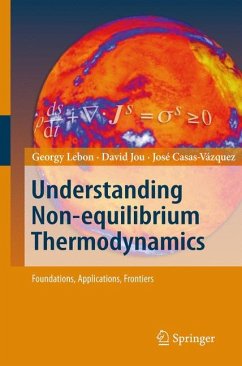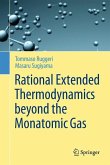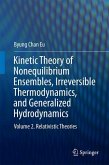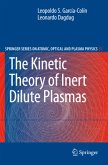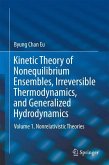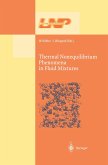Discover the many facets of non-equilibrium thermodynamics. The first part of this book describes the current thermodynamic formalism recognized as the classical theory. The second part focuses on different approaches. Throughout the presentation, the emphasis is on problem-solving applications. To help build your understanding, some problems have been analyzed using several formalisms to underscore their differences and their similarities.
Our time is characterized by an explosion of information and by an accel- ation of knowledge. A book cannot compete with the huge amount of data available on the Web. However, to assimilate all this information, it is n- essary to structure our knowledge in a useful conceptual framework. The purpose of the present work is to provide such a structure for students and researchers interested by the current state of the art of non-equilibrium th- modynamics. The main features of the book are a concise and critical pres- tation of the basic ideas, illustrated by a series of examples, selected not only for their pedagogical value but also for the perspectives o?ered by recent technological advances. This book is aimed at students and researchers in physics, chemistry, engineering, material sciences, and biology. We have been guided by two apparently antagonistic objectives: gener- ity and simplicity. To make the book accessible to a large audience of n- specialists, we have decided about a simpli?ed but rigorous presentation. Emphasis is put on the underlying physical background without sacri?cing mathematical rigour, the several formalisms being illustrated by a list of - amplesandproblems. Alloverthiswork,wehavebeenguidedbytheformula: "Getthemorefromtheless",withthepurposetomakeamaximumofpeople aware of a maximum of knowledge from a minimum of basic tools. Besidesbeinganintroductorytext,ourobjectiveistopresentanoverview, as general as possible, of the more recent developments in non-equilibrium thermodynamics, especially beyond the local equilibrium description.
Our time is characterized by an explosion of information and by an accel- ation of knowledge. A book cannot compete with the huge amount of data available on the Web. However, to assimilate all this information, it is n- essary to structure our knowledge in a useful conceptual framework. The purpose of the present work is to provide such a structure for students and researchers interested by the current state of the art of non-equilibrium th- modynamics. The main features of the book are a concise and critical pres- tation of the basic ideas, illustrated by a series of examples, selected not only for their pedagogical value but also for the perspectives o?ered by recent technological advances. This book is aimed at students and researchers in physics, chemistry, engineering, material sciences, and biology. We have been guided by two apparently antagonistic objectives: gener- ity and simplicity. To make the book accessible to a large audience of n- specialists, we have decided about a simpli?ed but rigorous presentation. Emphasis is put on the underlying physical background without sacri?cing mathematical rigour, the several formalisms being illustrated by a list of - amplesandproblems. Alloverthiswork,wehavebeenguidedbytheformula: "Getthemorefromtheless",withthepurposetomakeamaximumofpeople aware of a maximum of knowledge from a minimum of basic tools. Besidesbeinganintroductorytext,ourobjectiveistopresentanoverview, as general as possible, of the more recent developments in non-equilibrium thermodynamics, especially beyond the local equilibrium description.
From the reviews: "Understanding Non-equilibrium Thermodynamics is a self contained concise but rigorous book introducing the reader to the basic concepts of the thermodynamical process of the nature. ... The up-to-date references at the end of the book are valuable ... . The authors have done an excellent job in providing a clear, concise and well-presented description of the Non-equilibrium Thermodynamics. ... serve as a standard text for the students and researchers in physical sciences, mechanical engineering, aerospace engineering, and chemical engineering and material sciences." (K. N. Shukla, Zentralblatt MATH, Vol. 1163, 2009) "The book gives a comprehensive overview of the existing theories on non-equilibrium thermodynamics. ... a good introduction for Ph.D. students and researchers intending to work in the field of non-equilibrium thermodynamics. ... Several books on non-equilibrium thermodynamics have been published in the last several years, but the present one fills the gap of a unique text that reviews and confronts the several approaches developed, starting from different points of view on such a complex and challenging field." (Vittorio Romano, Mathematical Reviews, Issue 2010 b)

